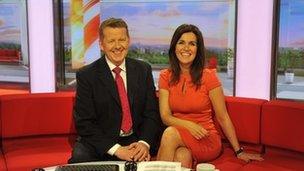BBC Breakfast celebrates 30 years
- Published
Original Breakfast Time presenter Nick Ross: "The atmosphere before we went on air was so tense"
BBC Breakfast is celebrating 30 years of broadcasting later with a trip down memory lane.
Considered a "huge risk" when it launched on 17 January 1983, Breakfast Time was the UK's first regular national breakfast show.
Famous for its magazine-style approach, it combined news and lighter features.
The 30th anniversary show will feature appearances from some of the original team, including The Green Goddess, fitness guru Diana Moran.
Introduced two weeks before rival broadcaster ITV's TV-am with David Frost, Breakfast Time hoped to lure audiences away from radio with a combination of news, travel information and lifestyle segments.
Although breakfast TV had been the staple diet in the US for three decades, the British public was wary of the innovation in 1983.
"It was a huge risk", recalled the programme's editor, Ron Neil.
"So many people were against the notion of breakfast TV and were willing it to fail."
Mixed reviews
With veteran sports broadcaster Frank Bough, former ITV news anchor Selina Scott and documentary presenter Nick Ross at the helm, BBC Breakfast aimed for a relaxed feel with its red sofa and steaming coffee pots.
As well as the news, viewers were treated to astrology from Russell Grant and fitness tips from the leotard-clad Moran, who encouraged viewers to "wake up and stretch up".
An estimated two million people tuned into the first show which received mostly favourable reviews, including The Times which called it "a bright, bold debut".
The Daily Telegraph said the show ''sped along with exemplary smoothness and panache. Except for a picture break-up toward the end, there didn't seem to be a hitch in sight.''
Press agency UPI also asked the audience for their views. "The keep-fit girl is the last thing I remember as I nodded off," said taxicab owner, Keith Naylor.
An unnamed viewer in Surrey said she liked "the little clock face in the bottom right hand corner of the screen telling you the time all the time," and "someone going through all the newspapers for you".

BBC Breakfast moved to Salford in April 2012
Breakfast Time trumped the rival ITV offering in the early ratings battle, which led to a cull of employees at TV-am including Peter Jay, Anna Ford and Angela Rippon in favour of "people-next-door" Anne Diamond and Nick Owen.
But not everyone was so positive about the BBC's new venture.
Sofas return
Germaine Greer questioned if there was anything better than "Assam tea and the radio to get the day going", while another commentator asked: "How can you eat a British breakfast with one hand while running from kitchen to living room to watch?"
BBC Breakfast has had several re-launches since its inception in 1983, including a move to a more formal, news-focused programme in 1989, when newscasters, including the BBC's former royal correspondent, Nicholas Witchell, sat soberly behind a desk.
But the cosier sofas returned just over a decade later when another re-launch saw the birth of BBC Breakfast in 2000.
Counting former Strictly Come Dancing winner Natasha Kaplinsky and Dermot Murnaghan among its presenters, the programme retained its ability to combine authoritative news and lighter features, appealing to a wide audience.
Since then the format has remained largely the same, but the biggest change came last year when, after 29 years of broadcasting from London, the flagship programme moved to new studios in Salford Quays.
The first edition of the programme, which now has a weekly reach of 13 million viewers, was broadcast by Bill Turnbull and Susanna Reid from its new home on Tuesday 10 April, 2012.
- Published15 March 2012
- Published15 March 2012
- Published10 April 2012